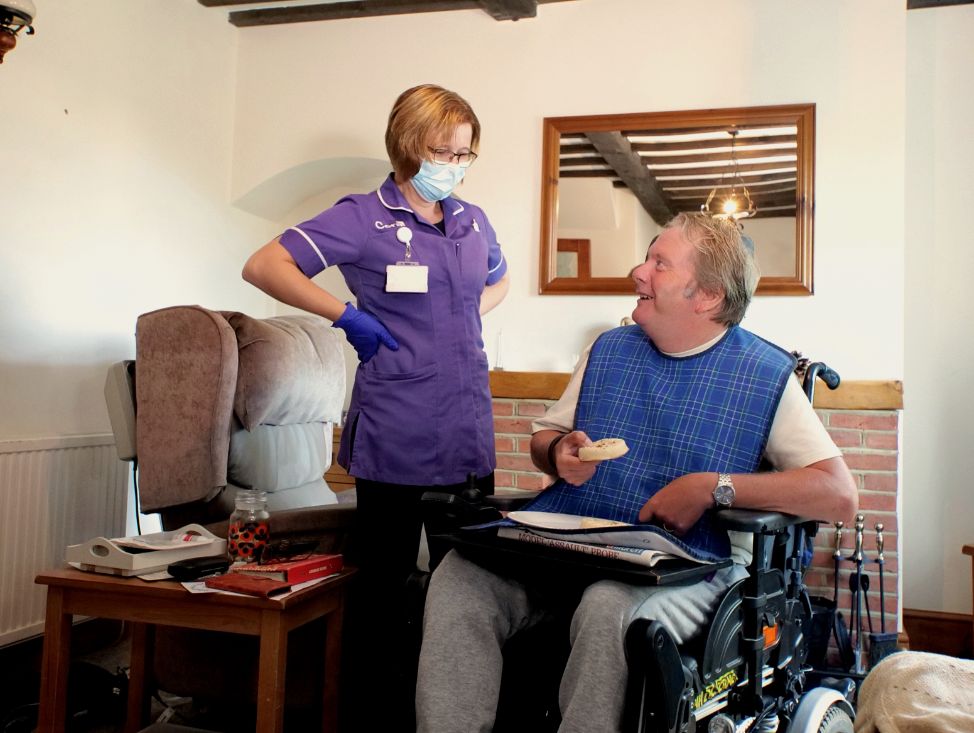Why is home care so important?
Home care, sometimes also called care at home or domiciliary care, is where a Care Assistant or support worker visits someone in their own home to look after them. This might be for just a short time after coming out of hospital or while a relative is away, or it might be a long-term arrangement
When someone needs a lot of extra support, care homes (sometimes called residential care, nursing or residential homes) are often the first thought. However, this can be a distressing decision and it’s not always necessary. Care at home can be a great alternative to moving to a care home.
In many cases, Care Assistants can help people to stay independent in their own homes, even if there’s a diagnosis of dementia or significant mobility issues.
Care at home can range from a short visit occasionally to offer a bit of help with medication or housework, all the way up to full-time live-in care.

Care assistants or support workers might help with lots of the daily tasks that might have become difficult, including:
- Washing, including showering or bathing
- Helping choose clothes or get dressed
- Making meals and feeding
- Giving medication, or reminding about the right times to take it
These tasks are known as personal care.
Homes can be adapted to help someone stay independent, by adding grab rails, stair lifts, accessible beds and chairs and many more aids as necessary.
If you or a loved one are considering home care, we’ve put together some of the top reasons it might be a good idea.
Staying in a familiar environment
Moving home can be traumatic, and doubly so if it comes at the same time as a hospitalisation, health crisis or a new diagnosis. Getting used to a new environment can be tricky, whether it’s a new house or moving to a care home.
However, home care can allow you or your loved one to stay at home and avoid that extra stress.
You can continue being part of local life. If you’re able to go out, you can still attend neighbourhood events, go to the same shops and visit local friends. Even if you’re no longer able to easily get out and about, you can still have visits from neighbours, see the same views from your windows and see the same GP and dentist.
While many people do take some of their own furniture and décor to a care home, there’s a limit to what you can fit into the space available. But staying at home means that you are surrounded by your own possessions – and the memories that they hold. If you have a diagnosis of dementia or struggle with your memory, this might be very comforting.
Staying at home is especially important for people who live with family or have pets. Leaving loved ones and animals to move to a care home can be a wrench. Home care lets you continue those relationships.
Costs may be lower
Depending on your requirements, you may find that home care doesn’t cost as much as a long-term stay in a care home. Residential care can be expensive, and you may find that you get more Local Authority support for home care.
More independence
In a care home, service users enjoy a degree of independence, but in many cases have to follow community guidelines. Meals will be served at set times, and activities and entertainment will happen according to a schedule.
If you choose home care, you’re not tied to this schedule. If your loved one prefers to wake later in the morning or have meals at different times, this can become part of their care plan.
You can choose your own entertainment. Whether that’s watching TV, reading or asking for some extra support to go to sporting events, the cinema or the theatre, it’s your decision.
If you prefer to spend time alone or like a quieter environment, moving to a care home might be particularly difficult, as you’d need to spend time with others every day. In your own home, you’re able to follow your familiar routines, with just brief interruptions to receive care.
Nursing and end of life care
In many cases, home care can continue up to the end of life. More than half of people say that they would like to die in their own home.
District and specialist nurses, doctors, hospice teams and other healthcare professionals are able to visit individuals in their own homes to support them.
Home Care Assistants can visit throughout the day and night to help, or even provide live-in care if it’s needed.
Helping family and friends
Home care is hugely important for the service user, but it’s also great for family and friends. Before accessing domiciliary care services, most care is provided by families – usually partners or children.
This can be difficult on relationships, particularly if the person receiving care is used to being very independent. It can be hard to get used to letting someone else help.
Bringing in external home care support can take some of that stress away. It allows you to be a family member, not just a carer.
Especially if you live apart, home care can give you peace of mind that your loved one will be looked after when you can’t be there.
Relieving pressures on other healthcare services
Whilst the most important thing is the well being of those being cared for, homecare also plays an important part in the structure of our health and social care system. Care visits in the home, alongside community nursing have an impact on other services such as NHS hospitals and local GP surgeries, freeing up beds and ensuring ill patients are still monitored regularly outside of hospital and doctors visits.
Carers have a vital part to play in identifying signs of common medical needs such as UTI's, fevers and dehydration - when caught early these can be treated with ease but could become serious if they go un-noticed.
Cera is developing our range of services and technology to support our care staff with these kind of scenarios so that the best outcome is achieved for everyone we care for.














